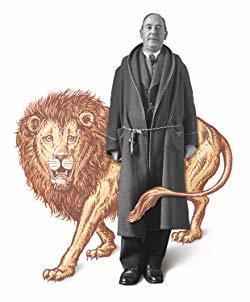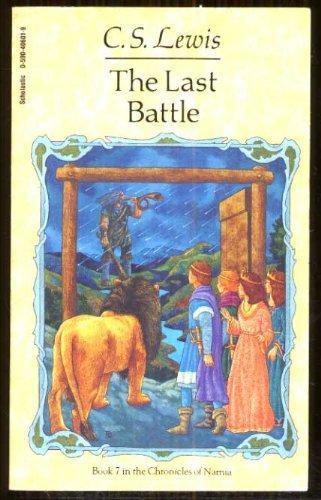I am sure you have all heard of CS Lewis’s Chronicles of Narnia and many of you probably know them well. Lewis’s fantasy world of Narnia is allegory for the Christian Story. The first book written (but not first chronologically) is “The Lion the Witch and the Wardrobe”. When the children first enter through a wardrobe and find themselves in Narnia the country is under the spell of the White Witch and as a result it is “always winter and never Christmas”. As we are introduced to this world the story of Aslan the Lion (the Jesus figure) is revealed. The foreshadowing of Aslan’s return is that first, Father Christmas comes and, second, spring comes. As the story unfolds, Aslan pays the price for Edmund’s betrayal and is killed but he comes back to life and a battle defeats the White Witch’s army. After this the four children are crowned kings and queens and reign well for many years, occasionally having to battle forces that are hangovers from the White Witch’s reign. They eventually return through the wardrobe and back to the exact time and place they left. The other books surround this one in their tales of Narnia. Other children, characters and even countries are introduced along the way.
In the final chapter of the final book “The Last Battle”, Heaven is described. (spoiler alert – if you don’t want to know how it ends, cover your ears). Heaven is described as the “Real Narnia” where “no good thing is destroyed.” As the characters enter, they realize they are no longer afraid, everyone from their histories seems to be there, things become clearer, brighter and they can look out and see various countries come into sharp focus including Narnia and England. But there is a change. It is the inner England, the real England where “nothing is destroyed.” And just to note, these books are situated during the 2nd World War. This is how the book and “The Chronicles of Narnia” end:
“You do not yet look so happy as I mean you to be.”
Lucy said, “We’re so afraid of being sent away, Aslan. And you have sent us back into our own world so often.”
“No fear of that,” said Aslan. “Have you not guessed?” Their hearts leaped and a wild hope rose within them.
“There was a real railway accident,” said Aslan softly. “Your father and mother and all of you are—as you used to call it in the Shadow-Lands—dead. The term is over: the holidays have begun. The dream is ended: this is the morning.”
And as He spoke He no longer looked to them like a lion; but the things that began to happen after that were so great and beautiful that I cannot write them. And for us this is the end of all the stories, and we can most truly say that they all lived happily ever after. But for them it was only the beginning of the real story. All their life in this world and all their adventures in Narnia had only been the cover and the title page: now at last they were beginning Chapter One of the Great Story, which no one on earth has read: which goes on for ever: in which every chapter is better that the one before.”
This new or real Narnia is not a replacement of the old Narnia, but rather, as one commentary put it, is “an entry more deeply into the very same place. Everything is more radiant. It is ‘deeper country.’ New Narnia is ‘world within world,’ where ‘no good thing is destroyed.’”
God does not destroy but rather transforms
It isn’t hard to think that Lewis could have had the vision which was read this morning from The Revelation of St. John in mind when he wrote about the real or new Narnia. Making new what already exists. (An important distinction in this reading – “I am making all things new”, rather than “I am making new things”.) It is about God dwelling with his people, pain and death destroyed, tears wiped away. In the Old Testament Ezekiel describes his wonderful vision of the water of life flowing from the temple. In the Revelation image, new life now flows from God, down out of heaven. As we heard in the Gospel, Jesus is God’s temple. This apocalyptic or end time image in Revelation is unique in that rather than a rapture where people are drawn up to God, God comes to the people.
See, the home of God is among mortals. He will dwell with them as their God; they will be his peoples, and God himself will be with them -- Revelation 21:3
So what about here and now? What does all this have to do with our current circumstances, both individually and as communities? This wonderful image of everything new is about resurrection certainly, but it is also about renewal. God does not destroy but rather transforms. And God does not leave us waiting. God sent Jesus, who is God’s temple, to be with us. The ascended Jesus has sent the Holy Spirit to us and we are the temple of the Holy Spirit. Although we may long for a place where “every tear will be wiped from our eye” we have the gift of God’s transformative love and the vision of a new order.
In this life, we are still confronting forces at work against God’s plan, just as the Kings and Queens in Narnia did. But we strive for the New Jerusalem, holding to the promises of Christ, in the knowledge of his death and resurrection and strengthened by the Holy Spirit for whom we are the temple.
As we have given thanks for this beautiful church, or temple and as we have dedicated it, once again, for God’s purposes, two things have come to mind for me, and I believe they are related. One is covenant and the other, is a word that has been coming to me a lot lately and that is stewardship.
Covenant -- a relationship that is fueled by inexhaustible love
First of all, covenant. Back in 2010 Archbishop Thabo Makgoba preached at St. George’s Cathedral in Cape Town, South Africa for Dedication Sunday and the celebration of the feast of All Saints, which is November 1. He spoke about covenant:
This generosity of God, dear friends, this overwhelming generosity, points to a very important aspect of covenant. For a covenant is not a contract. In contracts, parties give legal undertakings to effect transactions for reciprocal benefit. In covenants, people bind themselves together in pledges of faithfulness and loyalty, to promote mutual well-being. …And it is a living, growing, flourishing relationship with us that God wants – a relationship that is fueled by inexhaustible love, and by limitless generosity. This is what we find fulfilled in God’s New Covenant. As the prophet Jeremiah says, it is a covenant of the heart. Listen to his beautiful words: The Lord says ‘I shall be your God and you shall be my people.’ This is the definition of what it is to be a saint.
He goes on to remind us that we, who are his people, who have responded to God’s offer of overflowing love, are his saints. To be a saint, we need to belong to God, to belong to his church! I have spoken about God’s part in our covenant with him. What is our part? This is where stewardship comes in. This is a word that has been coming to me (confronting me) often in the past couple of weeks. For me I have been challenged to think about what kind of Steward I am. I am being challenged to think about how I can do my small part to be a better steward of this world – how am I less wasteful? How am I reducing my carbon footprint? And this leads to a bigger question – how can I live more simply? I am asking the question – not sure I have totally come to the answer! I have also been challenged to think about what kind of steward I am when it comes to my relationships, my ministry, my physical body and my time.
Stewardship is a response to God’s unfailing love
As we gather today in this beautiful space which is set apart as a temple – a place where we can gather in our covenantal relationship and be fed and nourished with word and sacrament, I want to think about stewardship. Often in churches when we hear the word stewardship we think of money. And that is a necessary thing – a church building needs to be maintained, fair salaries need to be paid and ministries within and beyond the church community require support.
Recently I was speaking to a woman who heads up the stewardship team in her parish. She told me she is passionate about Stewardship. This passion is deeply rooted in her childhood. She was one of 14 children and when she was 6 her father died. This was probably 70 years ago so you can imagine how difficult life was for her mother. She remembers her mother setting out her meager weekly income and the first thing she always did was put $1 aside for the church. This is stewardship and it is about way more than money. It was about her priorities in her challenged life. She put God first and this setting aside of money each week was tangible evidence of that priority.
So, certainly, money is necessary. I want to look at stewardship more broadly than money. Stewardship is a response to God’s unfailing love and generosity for us. At All Saints we can be inspired by many faithful people who devote their time and their various talents to this community and to the work of this community outside our doors. This morning I am personally grateful that I can bring my granddaughter to church and she will be lovingly cared for and instructed by Rose and her helpers. I am grateful for the women of the Altar Guild who have, with such care, set up our Altar this morning and I am grateful for Anne’s work and planning for our services and for the music team who put many hours into practice in order to deepen our worship experience. I am grateful that John has spent time with all things technical to make the service accessible for all. I am grateful that when the service is over, I can wander over and have a cup of tea or coffee. I have come to church without having to think about these things. They are just here for me because of the stewardship of this congregation.


In my ministry in Morley, I am grateful for the women who bring hot meals when I am conducting Grief and Loss circles – the nourishment goes way beyond the food. And I am grateful that when I have an important prayer request, I can email Christine and know a team of people will be lifting up my concern in prayer. These are a few of the ways people are giving of their time and talents in this place. I am sure we are all grateful, but I think we can become complacent, thinking that everything is running fine, not thinking about the fact that there may be people who would love a hand in what they are doing or even a break!
Stewardship is a new attitude
There are many good things happening here. What if we took the example of that widowed mother of 14 children and budgeted our time by making God our first priority. What would that look like? I think it would affect how we find time for daily prayer and study and how we treat people. It could also affect how we contribute to our time here at All Saints. This would include our study and our work both here and beyond our walls to the people Jesus constantly points us – those who are suffering, those who don’t know him, those who are lonely and isolated. If stewardship is rooted in our covenant with our God whose people we are, it is about a new attitude. It may mean taking notice of where you can join in or where you can initiate. Also rooted in this covenantal relationship is the aspect of generous hospitality.
We are called to partner in God’s New Way
We need to be on both sides of that hospitality – we need to invite people to join us in our various ministries and we need to respond positively to invitation. God makes all things new. As God’s people, as the temple of the Holy Spirit, we are called to partner in God’s New Way.
Thanks be to God for this glorious vision of our unending future with God.
Thanks be to God that we are called to this new order, that God comes to us, his saints.
Thanks be to God for the saints who have gone before us who inspire us to enter fully into this covenantal relationship.
In this place and at this time, on Dedication Sunday, I would like to end with this prayer of Self-Dedication:
Almighty and eternal God, so draw our hearts to you, so guide our minds, so fill our imaginations, so control our wills, that we may be wholly yours, utterly dedicated unto you; and then use us, we pray you, as you will, and always to your glory and the welfare of your people; through our Lord and Savior Jesus Christ. Amen.








